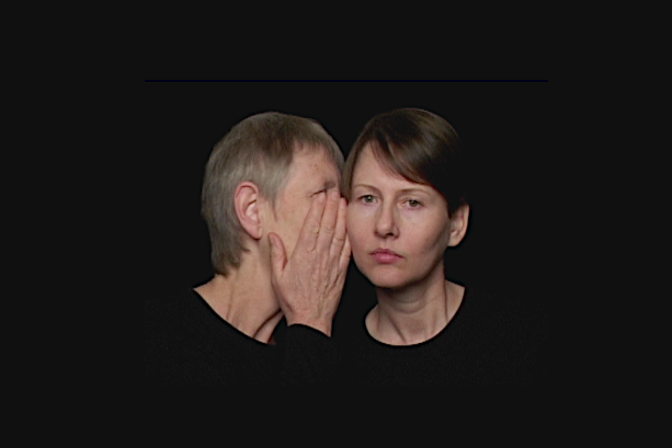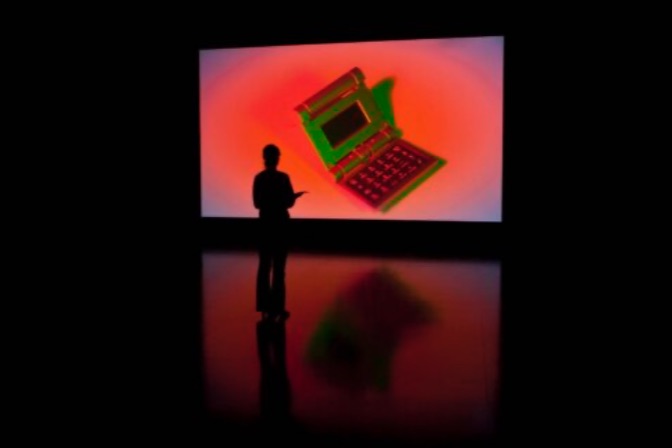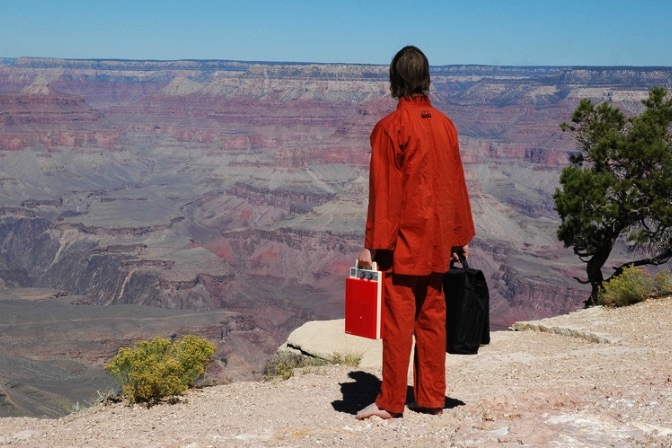Laurie Anderson (b. 1947, Illinois) is an internationally renowned artist whose pioneering work integrates performance, new media, music, and technology. As a key figure in avant-garde and experimental art, Anderson’s practice spans from spoken word to elaborate multimedia productions, making her one of the most significant voices in contemporary performance and media art.
As part of MetaPlex, a three-year research initiative supported by Future Cinema: The Cinematic Imaginary After Film, Anderson’s innovative live art and performance works were presented through archival material from the Institute of Contemporary Arts (ICA), London. MetaPlex, developed in collaboration with the ICA’s New Media Department and led by Peter Cornwell, aimed to explore the structures of institutional digital media archives and classification systems, challenging how they construct cultural narratives both within and beyond institutional frameworks. The overarching exhibition Future Cinema was curated by Jeffrey Shaw and Peter Weibel and presented at ZKM | Center for Art and Media Karlsruhe.
Trained in both violin and sculpture, Anderson’s practice is notable for fusing electronic music, invented instruments, narrative performance, and experimental technologies. She rose to prominence with the unexpected commercial success of her 1981 single “O Superman”, which featured on her debut album Big Science (1982). She continued to break new ground with the film Home of the Brave (1986), a concert documentary showcasing her dynamic visual and musical language.
Watch >> Interview
Read >> ZKM
Watch >> Work
Watch >> Performance
Anderson’s theatrical and multimedia performances—such as United States I–V (1983), Empty Places (1990), The Nerve Bible (1995), and Songs and Stories for Moby Dick (1999–2000)—explore the intersection of storytelling, politics, technology, and identity. Her performances blend music, projected imagery, electronic soundscapes, and philosophical rumination in a style that is both intimate and globally resonant. More recent works such as Life on a String (2001), Happiness (2001–2003), Homeland (2008–2010), and Delusion (2010–2011) continue this legacy, mixing personal narrative with socio-political commentary.
Anderson has exhibited her visual work widely, with solo exhibitions at leading institutions across the US and Europe. The 2003 retrospective The Record of the Time: Sound in the Work of Laurie Anderson, organized by the Musée d’Art Contemporain in Lyon, toured internationally through 2005. Her mixed-media and installation works, such as Self-Playing Violin (acquired by MoMA), and the exhibition The Waters Reglitterized at Sean Kelly Gallery in New York, further attest to the diversity and depth of her creative output.
In 2002, she was named NASA’s first official artist-in-residence, leading to the performance work The End of the Moon (2004), which reflected on space exploration, imagination, and human isolation. She has also created major orchestral works such as Songs for Amelia Earhart (2000), and contributed installations and films, including Hidden Inside Mountains for the 2005 World Expo in Aichi, Japan.
Anderson’s influence extends beyond her own practice; in 1997, she curated the Meltdown Festival at London’s Royal Festival Hall, shaping an entire program of experimental music and performance. Her accolades include the Dorothy and Lillian Gish Prize (2007) and honorary recognition from arts institutions globally. Her work is held in prominent public collections including the Imperial War Museum, Centre Pompidou, and Mori Art Museum.
Laurie Anderson’s inclusion in Future Cinema: The Cinematic Imaginary After Film positioned her as a pivotal figure in redefining the cinematic imaginary—moving away from traditional film towards immersive, performative, and interactive media that challenge the very frameworks through which narratives are produced, stored, and experienced.



